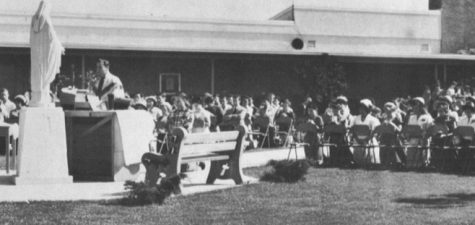The technical side of theatre
TEAM WORK MAKES THE DREAM WORK: From left to right, Juniors Kemper Rodi, Claire Riss, Keilah Mora, Zolie Pham, Sarah Castillo, and Cassidy Butcher jump for joy as they recreate the classic High School Musical cover photo. Each one is working as a tech lead for the 2022 senior musical, High School Musical. Hair and makeup lead Kemper Rodi has been on tech since her freshman year. She loves working with the cast members and expressing her creativity through makeup. Rodi has also been involved in the production of musicals as a cast member, though she enjoys the unique experience of tech much more. “I love tech because of the constant support from both cast and faculty, along with the creative opportunities that it offers,” Rodi said.
At Mater Dei, theatre students usually run theatre tech entirely on their own and essentially have total creative freedom. Everything from costumes, lighting, and stage management are in the hands of the tech crew.
For the annual Senior Musical, however, administration donates most of the funds, so the technical aspects are professionally organized. Due to this, the tech leads have less of a say in the creative process. Nonetheless, Senior Musical offers a unique experience not only to cast members, but also to the members of the tech crew. This year, Mater Dei’s senior production is High School Musical.
KEILAH
Junior Keilah Mora is the Stage Manager for this year’s Senior Musical. Stage managing is the highest role a student can achieve in tech. They essentially run the whole production from behind the scenes. Stage managers keep track of everyone’s information, rehearsal schedules, director’s notes, crew and cast emails, and they call cues during the show.
“I decided to be a stage manager because I have always admired the hard work they do, and I wanted to try it for myself,” Mora said.
Senior Musical is completely different from other musicals that are done at Mater Dei. It is a senior-only tradition that combines veteran theatre students with new students who have never been in a theatre production. The Theatre Arts program promotes new recruits to join Senior Musical so they can have a well-rounded cast who are all looking for an exciting way to end senior year. With the majority of the cast being brand new to the theatre world though, they have a lot to learn about the whole process.
“Senior Musical is a whole new way of life,” Mora said. “It’s a show [where about] 80% of the cast is completely new to theatre. It is more of a fun production than most.”
As stage manager, Mora has to attend every rehearsal so she can know exactly what the cast is working on and where help is needed. She is one of the few people from the tech crew that gets an inside look into the musical before tech week. She is the director’s right-hand-man who takes notes of stage directions and observes who might need extra help with dancing, singing, or acting.
“My favorite [rehearsals] are music rehearsals. I have always loved listening to all the songs come together,” Mora said. “The cast always has the most fun with the singing portion.”
Stage managing can be a difficult role. Working behind the scenes has the same amount of stress as performing on stage. Mora has been on both ends as she has acted in numerous plays and musicals and been involved in different aspects of technical theatre. Since most departments of tech do not work with the cast until tech week, it tends to be a busy time for both the actors and the crew.
“The hardest part of the process is tech week. It is the most stressful time because it is crunch time before the show,” Mora said. “Everyone is crazy during [that week].”
The technical crew works tirelessly behind the scenes to produce the shows that theatre performs. Even though the crew does not get as much creative freedom for Senior Musical, there is still a lot of love and effort put into their work. Senior Musical is a memorable tradition for seniors to help them destress during the second semester as they await college acceptances. It is considered by many students to be more of a carefree experience rather than serious.
“I think that it is a fun way to end senior year with your friends,” Mora said. “Singing, acting, and dancing with your friends by your side sounds like the best to me.”
CASSIE
Junior Cassidy Butscher is the costuming lead for Mater Dei’s 2022 Senior Musical. As costuming lead, Butscher works to design and produce costumes for the entire cast of the play. She loves being able to create unique costumes for each member of the show.
“I love making the individual costume pieces,” Butscher said. “My favorite thing to do is to make something amazing out of practically nothing.”
Butscher believes that costuming is critical to show the parts of a character’s personality that may not be as evident from their stage presence alone. Not only that, but costumes also play a part in establishing the setting and time period of the show.
“Costuming is unique because you get to show the audience who the characters are, even before the actors open their mouths,” Butscher said. “It’s taking into account personality, time period, situation, etc. of the characters and portraying that through their costume.”
Usually, as costume lead, Butscher makes all pieces of the costumes from scratch. However, for Senior Musical, the costuming tech crew works more to manage costumes and make sure they fit right since the costumes are pre-ordered. The crew works on supervising and ensuring everything concerning costuming runs smoothly. The work is slightly different from other productions, though just as challenging and time consuming. Despite the difficulty of being on the tech crew, Butscher loves seeing all of her hard work pay off during the final performance.
“It’s the most amazing feeling to see all of your hard work come to life on stage,” Butscher said. “It makes everything worth it.”
Part of the challenge of costuming is finding a way to measure, design, produce, and revise costumes for the entire cast with a limited time period. Most productions begin rehearsing two to three months prior to opening night. In this time, the costuming crew must have all of the outfits done and ready by tech week. As the lead, most of this work falls to Butscher.
“The hardest part [of costuming] is getting everything done and [looking] the way you want [it to look] in the short amount of time you have,” Butscher said.
Butscher enjoys the creative freedom the theatre department grants the costuming crew. There are limited restrictions for the students besides time and money, and the students essentially run the entire crew. The faculty directors place the bulk of responsibility on the student crew, allowing them to express their creativity and take the technical aspects of the show wherever they see fit.
“Everything is done completely by the students,” Butscher said. “The costume lead designs everything and gets the costumes. It’s up to us what the costumes look like and to make sure everyone has a costume. Obviously, the costume designer has to stay within budget and time limit, but it’s more of a challenge than a restraint.”
CLAIRE
Junior Claire Riss is the current co-lead for the lighting tech team. Riss has been involved with the technical side of theatre since her sophomore year, working on publicity as well as being a Assistant Stage Manager for the 2022 production of Once on This Island. A veteran to the technical side of theatre, Riss has experience with almost all of the behind the stage processes.
“I was on the publicity team for The Little Mermaid and just helped to promote the play, put up posters, and design the shirt. I also worked on sounds for the Fall play, Failure: A Love Story, this year. And I was just assistant stage manager for the musical, Once on this Island,” Riss said.
In Riss’ experience, she has found that lighting plays a major role in conveying the emotions of certain scenes. She additionally has learned that different lighting tones work better for different actors. There is no universal color for a specific emotion; instead, it is the lighting crew’s job to watch each actor and choose a color that best suits their specific portrayal. Riss feels that lighting must be very specific to each actor, as certain tones do not match with that actor’s depiction of a specific emotion. Even one small error in the lighting can shift the entire mood of the scene.
“There’s certain colors that you put on stage to convey one emotion, but they don’t always work with the [actors’] [performance],” Riss said. “[You have to] try to combine what you thought when you first initially saw the scene and how [the actress] conveys that emotion and mesh those together.”
Unlike other tech crews, such as costuming, that gradually develop their art throughout rehearsals, the majority of lighting work takes place during tech week. During tech week, the production is run all the way through for the first time with lighting, costumes, and sound. The lighting leads need to be able to see how all the costumes and acting come together and whether the initial cues even work for a given scene. Riss stresses the importance of tech week, claiming that, prior to it, the show is just a jumble of pieces. It is the time spent and continuous run throughs that occur during tech week that make a show a true production.
“[Tech week] is a huge time [drain]. A show can be in total shambles in the first couple days of tech week, but we’ll end up show ready in three days,” Riss said. “Everything gets put together for the first time, [and] all the technical aspects come together with all the actors for the first time. So when you get together, it’s really magical.”
In productions, lighting is usually changed to convey a shift in emotion or change of scenery. Riss describes the process as being challenging due to trying to find a balance between what the director had imagined for the scene versus what the lighting leads had imagined. This is yet another reason why lighting does not really come together until tech week. That week of time is the one week where the lighting team can gather with the directors and touch base on what is expected for certain scenes.
“It can be challenging trying to strike a balance between the director’s ideas and what you’ve previously thought because you don’t really touch base until tech week,” Riss said. “When you’re stressing [and] trying to fix it, [it’s hard to] have someone talking over your shoulder [saying] you need to do this, this, and this, [when] they don’t know how to do it themselves. It’s a bit hard sometimes but most of the time, it works out fine.”
Despite the challenges, Riss loves seeing her work on the night of the performance. She feels as though she is able to convey emotions and moods through lighting that may not have been obvious through speech and acting alone. She loves the creativity that goes into lighting and the ability to express how she experiences the scene.
“I like being a lighting [crew member] because I feel like you get to convey something that’s not just conveyed by speech, like when you’re looking at a scene and it’s supposed to be happy and you see this deep blue light, it’s gonna take away the meaning,” Riss said.“I like it because you get to amplify the creative twist of the actor with something that you creatively made yourself. It’s [a] cohesive creation.”
Riss loves the creative freedom she has experienced through tech, though she feels a lot of people do not appreciate the hard work and time that goes on behind the scenes. She feels as though the importance of tech gets lost in the show, where all of the attention is focused on the primary cast members.
“Your work doesn’t always get recognized, because a lot of people who aren’t involved in theatre just say, ‘Oh, you’re in this production, what character do you play?’ [When you tell them you work] behind the scenes on XYZ, [they] sometimes don’t take you seriously,” Riss said.
Nonetheless, Riss loves being a part of the theatre tech team. It is so different from the acting side of theater, as most of the work is done behind the scenes with teams of technicians. Riss wishes she had joined theatre tech earlier, as the experience has been so great thus far. She encourages everyone to try it out as soon as possible.
“I didn’t get involved in theatre stuff until sophomore year. I regret it… waiting that long,” Riss said. ”If someone is considering even just hopping on a team and coming in just for tech week and that’s it, I recommend it. It’s so much fun. If you don’t like it, then you don’t have to do it again. But always try it.”
Your donation will support the Student Publications Department at Mater Dei High School. Your contribution will allow us to keep our equipment up to date and cover our annual website hosting costs.





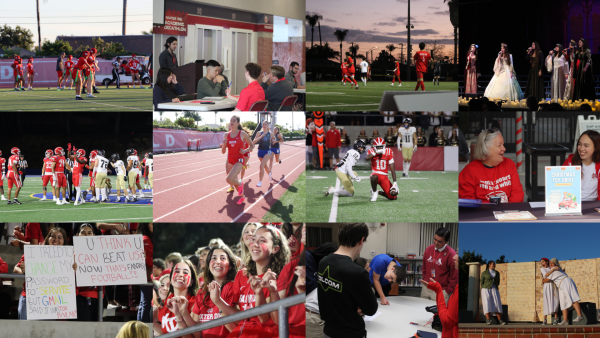

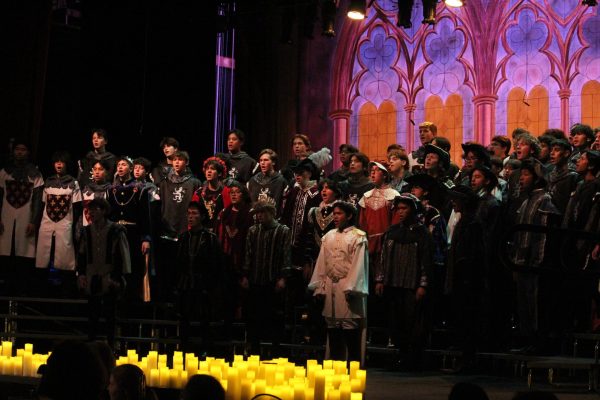
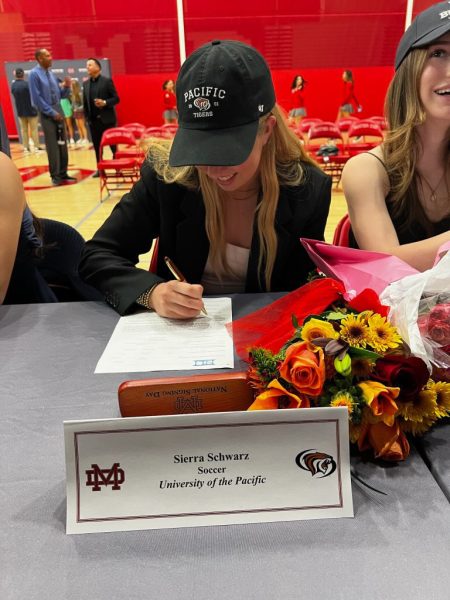
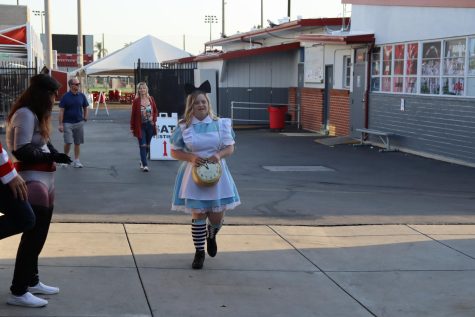

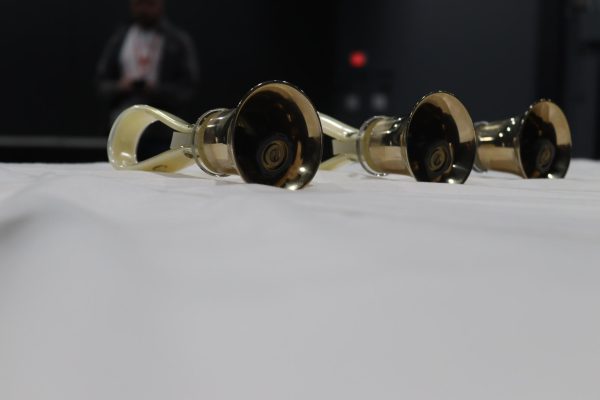
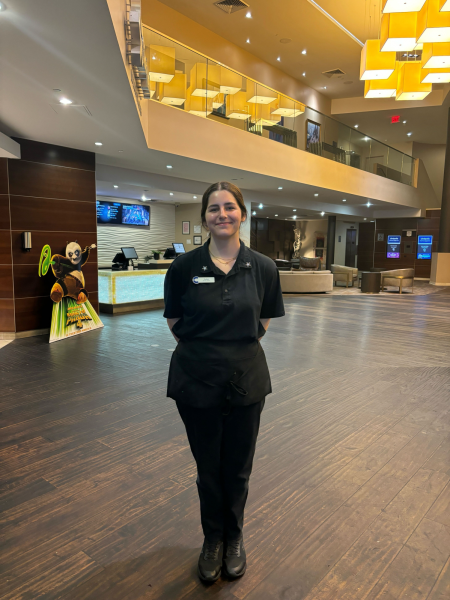
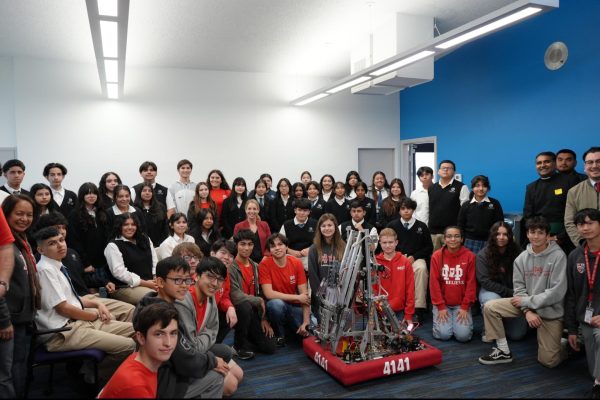
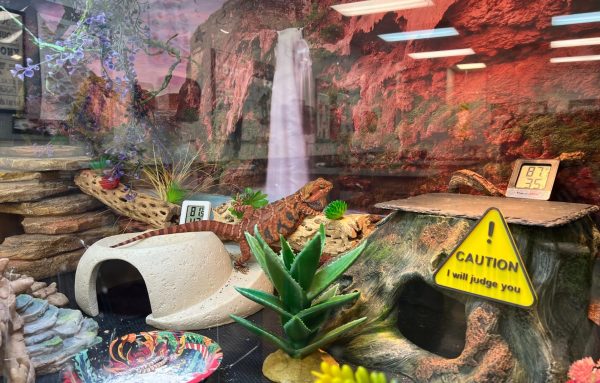


![PLAYING A ROLE: Sister Charis (right) of Heart of Jesus Retreat Center applies costume makeup for Sacred Heart Kids Club Staff for a video. Staff members are expected to participate in Kids Club events, including videos, skits, games, and other activities. These activities help the kids understand the topics being discussed, such as the seven sacraments and their purposes, and set examples for the kids. “You get to work with [people] your own age, and it’s really just tons of fun,” Sister Paula said.](https://thescarletscroll.com/wp-content/uploads/2022/03/sacredheart-475x316.jpg)
![SMILE FOR THE CAMERA: The 1988-89 yearbook shows the first Scarlet Scroll staff with their advisor, Susan Diaz. As a new publication, the newspaper staff had to put extra care into making sure what they were reporting on set a positive precedent for the paper on campus. “The administration at the time was very afraid that the Scroll would immediately turn into a format where students could just take pop shots at [them],” Gene Jimenez, a member of the 1988-89 staff, said. “And when we showed them that we could actually produce [something] as semi-responsible adults, it was a big deal.”](https://thescarletscroll.com/wp-content/uploads/2021/11/doc00617420211117152104-copy-317x475.jpg)
